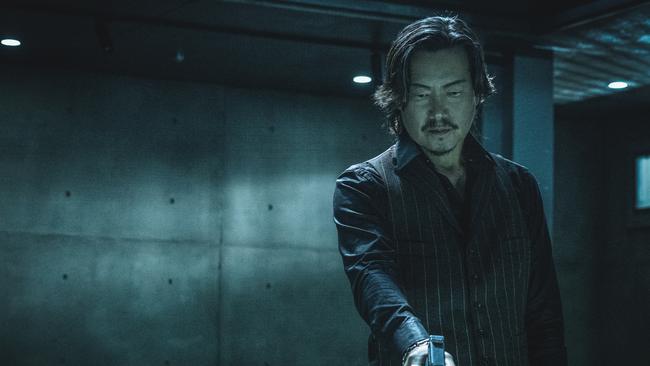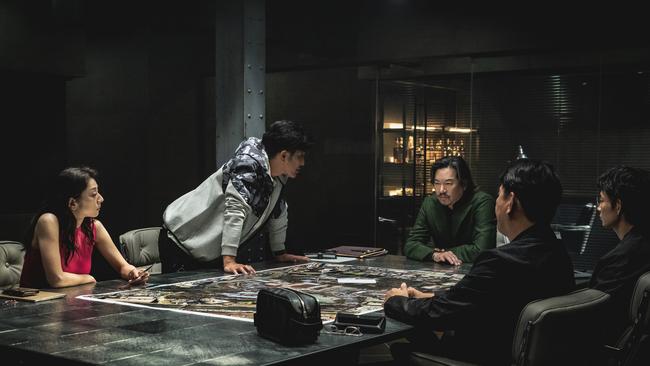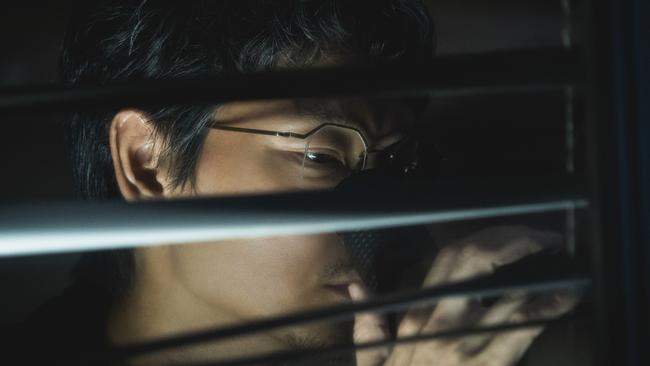Japanese noir thriller Tokyo Swindlers is mired in high stakes violence and real estate fraud
Welcome to a world of dodgy criminality and intricate conspiracies, centred on the machinations of a wonderful scotch-drinking villain and his elaborate schemes to pull off the ultimate heist.

‘You are unearthing something that will entertain, enlighten, amuse, horrify, mangle, jangle, keep you riveted,” bestselling American novelist Harlan Coben said about pulp fiction in an introduction to a collection of classic crime stories from the 1920s, ’30s and ’40s.
Today it’s a generic term for dark, gritty narratives in which suspense, violence and humour are linked and imaginatively interlock with each other, often overlaid with a brooding melancholy and operatic set pieces. Its writers create worlds through the lens of characteristically brutal storytelling – Stephen King calls the genre Hard Case Crime – where everything is possible and almost nothing is certain, and which so often can be highly pleasurable.
They are stories about crime and not necessarily about those solving it – think of Quentin Tarantino’s movies, the novels of Lawrence Block or Elmore Leonard, who loved his villains, or TV shows such as Breaking Bad and Fargo.
Netflix has just delivered a cracker called Tokyo Swindlers, a contemporary Japanese noir thriller immersing us in a world of dodgy criminality and intricate conspiracies, centred on the machinations of a wonderful scotch-drinking villain and his elaborate schemes to pull off the ultimate heist. It’s an entertaining, brooding crime melodrama, a cleverly worked blend of fact, fiction and myth.
“It seemed a little too pat,” detective hero Philip Marlowe suggested of a case he was working on in Raymond Chandler’s The Big Sleep. “It had the austere simplicity of fiction rather than the tangled woof of fact.” It’s a great description of this kind of hard-boiled story, capturing a world where the stark lines between good and not-so-good are blurred, and we are never sure who we support. Well, usually the crooks.
Inspired by recent land-fraud scandals, Tokyo Swindlers is a seven-part series based on Ko Shinjo’s novel of the same title. It’s written and directed with an enthusiast’s feeling for the complexities of hard-boiled fiction by Hitoshi One, best known in Japan for several manga adaptations and paparazzi dramedy Scoop.
Shinjo’s book seems to have been based on some recent high-profile fraud cases in which some developers lost billions of yen to scammers pretending to be selling sought-after plots of land. It appears he was inspired by the revelation of one scam after another in Tokyo, where real estate fraud gained pace as the price of land went up. Presenting the story from the criminals’ point of view, he hoped to provide a warning insight into how these nefarious operations were brought off and the pain they caused.
The context to what becomes an intense, gripping narrative is established in the striking titles sequence filling in the backstory of land fraud in Japan, unfolding against a black-and-white visual photographic essay detailing Tokyo’s urban development.
This is graphically intercut with close-up shots of counterfeit documents being prepared, stamps being applied, and soaring aerial shots of a city that lurches and hisses nonstop. “Land swindlers steal large sums of money by posing as landowners who want to sell their land using forged documents,” the voice-over narrator tells us, as though introducing a documentary, establishing a kind of true-crime framework, a kind of metanarrative to the fiction.

The truth swings between what seems real and what is merely a fictional projection, but the well-tried “truth is stranger than fiction” expression offers authenticity to the stylised proceedings.
The rather urgent stentorian voice continues to tell us of the way land fraud occurred all over Japan during the post-war period when society and government offices were still in chaos. And then how during the economic bubble of the late 1980s and the early ’90s real estate prices surged and land fraud often occurred again in urban areas.
But then the digitalisation of real estate trading documents made it more difficult for scammers to steal identities and fraud subsided.
When Tokyo was selected for the Olympic Games, land prices went up and fraud increased again, and Shinjo’s story takes us straight into a meticulously orchestrated scam as the city’s real estate market becomes a matter of life and death for some developers.
The series actually begins with an aphorism from Ming dynasty Chinese philosopher Hong Zicheng’s Caigentan, an enigmatic tome subtitled Vegetable Roots Discourse. “In water too clear live no fish; but in dirty soil grow abundant crops,” it tells us.
It appears to relate to the path seemingly ordained in life – complex, absurd, and grotesque – of one of the two central characters, Harrison Yamanaka, played by Etsushi Toyokawa in a cool, wonderfully enigmatic performance.
He’s the leader of the scammers, the organiser mastermind criminal who leaves no one behind alive after working with them, watching their executions as snuff films while drinking the best Highland scotch.
He delights, he says, in jobs so big “there’ll be dead bodies everywhere” by the time he’s finished. He’s rather fond of Port Ellen whisky, with its aromas of cinnamon, oranges, leather and bonfires. As its label says, “Generously spicy and fruity, this dram invites slow contemplation.” Something in which Harrison likes to indulge after killing his colleagues. We find him at the start of the drama somewhere in a densely wooded area in the American wilderness telling a fellow moose hunter he is a land swindler. As a bear comes from nowhere and attacks their guide, he finally shoots the animal in the mouth as it charges towards him.
He later, in a fast cut, tells a seeming protege called Takumi, a gloomy young man of uncertain background played with an attractive diffidence by Go Ayano, who will become a central player, of the ecstasy he felt.
“Without a shadow of doubt that bear believed it was going to own me,” he says, sipping an expensive Glenlivet this time. “But it turned ugly and miserable and in a single moment it died.”

He invites Takumi to become a land swindler. “The man who ruined your life was a land swindler,” he tells him. “This time why don’t you push someone else down into hell?”
We later learn that Takumi has somehow deliberately placed himself in this line of work so he can track down the scammer who swindled his father and was responsible for the deaths of his wife and son in a terrible fire.
As the police investigate the death of one of Harrison’s victims, we prepare for a huge heist, Takumi now ensconced as the swindler’s negotiator. He joins legal adviser Goto (Pierre Taki), master forger Nagai (Shota Sometani) and Reiko (Eiko Koike), the director who finds, auditions and then trains the impostors Harrison uses to pose as actual landowners.
We are not given backstories for any of these characters, but the actors are strong enough to quickly guarantee their authenticity.
They set their sights on a large property group called Mike Homes and we follow almost in documentary style the process in which they carry out their scam. (Later, the target is a prime piece of largely vacant property in central Tokyo next to Kouan-ji temple owned by a nun who has vowed never to sell.)
In a parallel plot we become aware of an ageing detective, who has had run-ins with Harrison before, beginning to investigate the fraudsters and slowly gaining ground. He’s an officer called Tatsu who is on the verge of retirement and is stoic and carries his own code of honour, but he appears marginalised inside the politics of his department.
Harrison seems to have eyes and ears everywhere. But Tatsu, somewhat reluctantly – he’s a solitary kind of cop – gains a new partner in the capable Detective Karamo Chi and the investigation gains traction.
But this is not a story about the complex machinery of clues; it’s really about the thrillseeking Harrison and his complex and ambiguous role as an arch villain and his involvement with Tokyo’s criminal underworld, and Takumi’s search for redemption.
The storyline resembles Tokyo itself – unexpected intersections, secrets hidden in backrooms, clandestine trysts in glamorous hotel rooms, power coursing mercilessly among the so-called corporate salarymen, and lives dangling from dangerous heights.
The series reminds me of the Parker novels of Donald Westlake, written under the pseudonym of Richard Stark, in which career thief Parker plots elaborate heists alongside a shifting crew of professional crew of criminals.
Like Tokyo Swindlers, these stories are really about work, finding heists, organising the mechanics, accessing the equipment required and calibrating the possible resistance.
Westlake said of Parker, “I’d done nothing to make him easy for the reader; no small talk, no quirks, no pets.” You won’t find any in Tokyo Swindlers, either.
Tokyo Swindlers is streaming on Netflix






